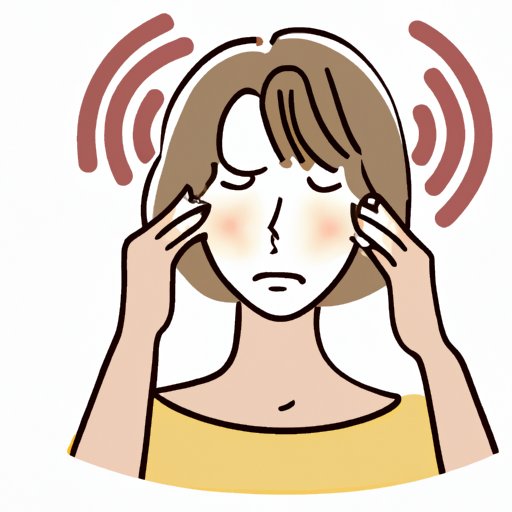
I. Introduction
Do you ever feel like the world is spinning around you or have trouble maintaining balance? You may be experiencing dizziness, a common condition that affects millions of people every year. In this article, we will explore the various causes of dizziness, symptoms to watch out for, and treatment options available.
II. The Top 5 Reasons for Dizziness You Need to Know About
Dizziness can be caused by a multitude of factors. However, some are more common than others. Here are the top five reasons for dizziness:
1. Inner Ear Problems
The inner ear is responsible for maintaining balance. If there is a problem with the inner ear, such as an infection or inflammation, it can result in dizziness.
2. Low Blood Pressure
Low blood pressure can cause dizziness, especially when standing up quickly. This is because the sudden change in position can cause a drop in blood flow to the brain.
3. Migraines
Migraines are severe headaches that can include dizziness and nausea. They may be triggered by a variety of factors, such as stress, skipping meals, or caffeine.
4. Anxiety Disorders
People with anxiety disorders may experience dizziness as a symptom of a panic attack or as a result of stress and hyperventilation.
5. Medication Side Effects
Some medications, such as those used to treat high blood pressure or anxiety, can cause dizziness as a side effect.
III. Feeling Lightheaded? Here’s What Might Be Causing Your Dizziness
Dizziness can also be caused by minor issues. Here are some possible culprits:
1. Dehydration
Dehydration can cause dizziness, especially in hot weather or during exercise. Drinking plenty of water can help keep dehydration at bay.
2. Hyperventilation
When people hyperventilate, they breathe too quickly and exhale too much carbon dioxide. This can result in dizziness and lightheadedness.
3. Heat Exhaustion
Heat exhaustion occurs when the body overheats. It can cause symptoms such as dizziness, fatigue, and nausea.
4. Motion Sickness
Some people experience dizziness when traveling, especially when traveling by car, plane, or boat. This is called motion sickness and is caused by conflicting signals sent to the brain about movement.
5. Low Blood Sugar
Low blood sugar (hypoglycemia) can cause dizziness, weakness, and confusion. Eating a snack with carbohydrates can help alleviate these symptoms.
IV. The Connection Between Vertigo and Feeling Dizzy: Explained
1. Definition of Vertigo
Vertigo is a form of dizziness that causes the sensation of spinning. It can be associated with nausea, vomiting, and difficulty balancing.
2. Causes of Vertigo
Vertigo can be caused by inner ear problems, such as benign paroxysmal positional vertigo (BPPV), Meniere’s disease, and vestibular neuritis. It can also be caused by head injuries or migraines.
3. Differences Between Vertigo and Other Types of Dizziness
Vertigo is a specific type of dizziness that causes a spinning sensation, while other types of dizziness may cause lightheadedness or feeling unsteady.
4. Treatment Options for Vertigo
Treatment for vertigo depends on the underlying cause. For BPPV, physical therapy maneuvers may be performed to help move the crystals in the inner ear. Medications, such as meclizine, can help alleviate symptoms. In severe cases, surgery may be necessary.
V. How to Tell if Your Dizziness is a Sign of a More Serious Condition
1. Red Flag Symptoms to Watch Out For
Some symptoms that may indicate a more serious condition include blurred vision, chest pain, difficulty speaking, and weakness on one side of the body, among others. If you experience any of these symptoms, seek medical attention immediately.
2. When to Seek Medical Attention
If you experience persistent or severe dizziness, it is important to seek medical attention. Additionally, if you have a pre-existing medical condition or are taking medication that may cause dizziness, talk to your doctor about your symptoms.
3. Diagnostic Tests and Procedures
Your doctor may perform a physical exam, blood tests, or imaging tests, such as an MRI or CT scan, to determine the underlying cause of your dizziness.

VI. The Surprising Factors That Can Trigger Dizziness and How to Prevent Them
1. Certain Foods and Drinks
Some people may experience dizziness after consuming certain foods or drinks, such as alcohol, caffeine, or monosodium glutamate (MSG). Avoiding these triggers may help reduce the occurrence of dizziness.
2. Changes in Posture or Movement
People may experience dizziness as a result of sudden changes in posture or movement, such as standing up too quickly or turning their head. Slow, deliberate movements can help prevent dizziness in these situations.
3. Environmental Factors
Environmental factors, such as bright lights, loud noises, and high altitudes, can cause dizziness in some people. Minimizing exposure to these triggers may help reduce symptoms.
4. Stress and Anxiety
Stress and anxiety can cause dizziness as well as other symptoms, such as muscle tension and headaches. Relaxation techniques, such as deep breathing or meditation, can help reduce stress and anxiety and prevent dizziness.
5. Strategies for Reducing Dizziness Triggers
In addition to the above strategies, getting enough sleep, exercising regularly, and avoiding smoking can help reduce the occurrence of dizziness.
VII. Dizziness in Women: Understanding Hormonal Changes and Its Effects
1. Hormonal Changes During Pregnancy and Menopause
During pregnancy, hormonal changes can cause dizziness, particularly during the first trimester. Menopause is also a time when hormonal changes can cause dizziness in some women.
2. Connection Between Hormonal Changes and Dizziness
Hormonal changes can affect the inner ear, which can cause dizziness in some women. Additionally, changes in blood pressure and blood sugar levels can also contribute to dizziness during hormonal changes.
3. Treatment Options for Hormonal-Related Dizziness
Treatment options may include hormone replacement therapy, medication to regulate blood pressure or blood sugar levels, or lifestyle changes such as dietary adjustments or stress reduction techniques.
VIII. Navigating the World with Chronic Dizziness: Coping Strategies and Treatment Options
1. Psychological Impact of Chronic Dizziness
Chronic dizziness can have a significant impact on a person’s quality of life, including their ability to work and participate in activities they enjoy. It can also lead to anxiety, depression, and isolation.
2. Coping Strategies for Daily Life
Coping strategies may include avoiding triggers, using mobility aids, such as canes or walkers, practicing relaxation techniques, and seeking support from a counselor or therapist.
3. Medical Treatments for Chronic Dizziness
Treatment for chronic dizziness may include medication, physical therapy, or surgery. In some cases, a combination of treatments may be necessary to manage symptoms.
IX. Conclusion
Dizziness can be a frustrating and debilitating condition, but there are ways to manage and alleviate symptoms. Remember to seek medical attention if you experience persistent or severe dizziness, and don’t hesitate to ask for help coping with chronic dizziness. With the right treatment and support, you can regain your balance and enjoy a full and active life.





